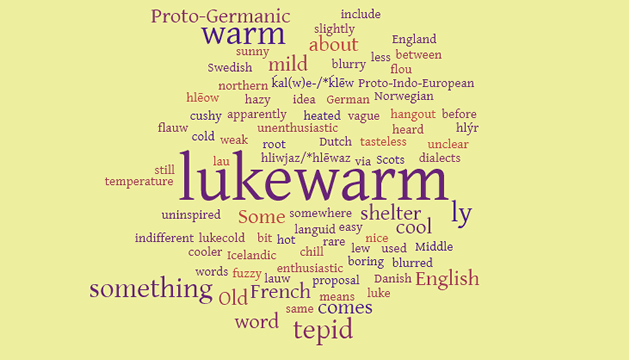If something is lukewarm [ˌluːkˈwɔːm / ˌlukˈwɔɹm], it is somewhere between warm and cool. Or you might be lukewarm (unenthusiastic) about an idea or proposal.

Something that is a bit cooler than lukewarm, or something that you’re less enthusiastic about is lukecold, a rare word that I hadn’t heard before.
The word luke comes from the Middle English lew (tepid), which is apparently still used in some dialects in northern England, and also in Scots, where it means lukewarm, tepid or slightly heated. That comes from the Old English hlēow (warm, sunny), from the Proto-Germanic *hliwjaz/*hlēwaz (lukewarm), from the Proto-Indo-European *ḱal(w)e-/*ḱlēw- (warm, hot).
Some words from the same Proto-Germanic root include:
- Danish: ly = shelter
- Dutch: lauw [lɑu̯] = lukewarm (temperature); cold, indifferent; nice, cool, chill, and flauw = boring, tasteless, uninspired; languid, weak, vague, hazy (via Old French)
- French: flou [flu] = fuzzy, blurred, blurry, unclear
- German: lau [laʊ̯] = lukewarm, tepid; mild; cushy, easy
- Icelandic: hlýr [l̥iːr] = warm
- Norwegian: ly [lyː] = lukewarm, mild; shelter
- Swedish: ly = hangout
Sources: Wiktionary, Dictionaries of the Scots Language /
Dictionars o the Scots Leid